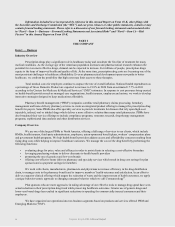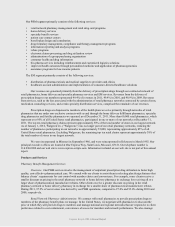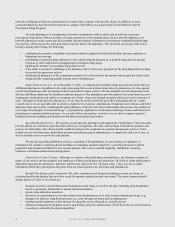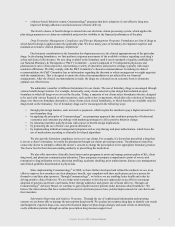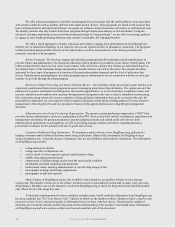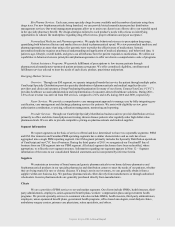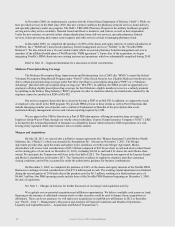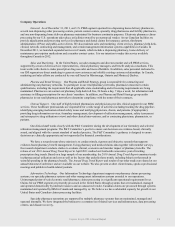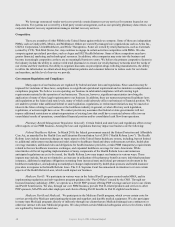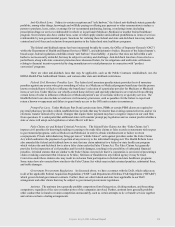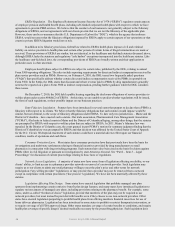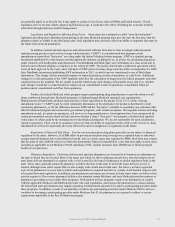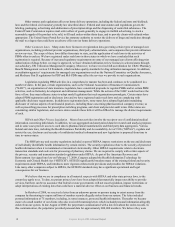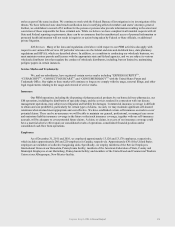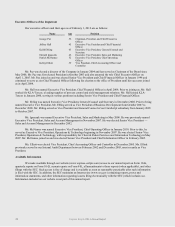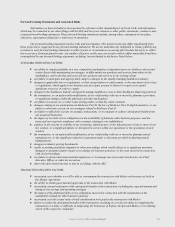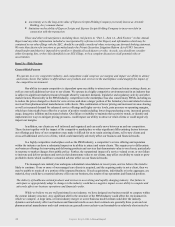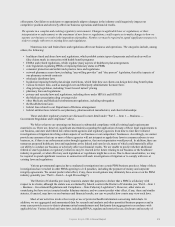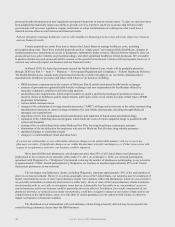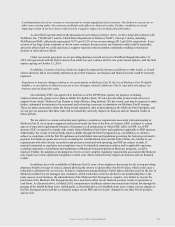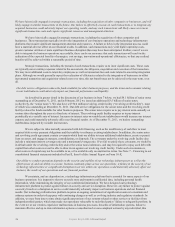Express Scripts 2011 Annual Report Download - page 18
Download and view the complete annual report
Please find page 18 of the 2011 Express Scripts annual report below. You can navigate through the pages in the report by either clicking on the pages listed below, or by using the keyword search tool below to find specific information within the annual report.
Express Scripts 2011 Annual Report
16
ERISA Regulation. The Employee Retirement Income Security Act of 1974 (―ERISA‖) regulates certain aspects
of employee pension and health benefit plans, including self-funded corporate health plans with respect to which we have
agreements to provide PBM services. We believe that the conduct of our business is not generally subject to the fiduciary
obligations of ERISA, and our agreements with our clients provide that we are not the fiduciary of the applicable plan.
However, there can be no assurance that the U.S. Department of Labor (the ―DOL‖), which is the agency that enforces
ERISA, would not assert that the fiduciary obligations imposed by ERISA apply to certain aspects of our operations or that
courts in private ERISA litigation would not so rule.
In addition to its fiduciary provisions, federal law related to ERISA health plans imposes civil and criminal
liability on service providers to health plans and certain other persons if certain forms of illegal remuneration are made or
received. These provisions of ERISA are similar, but not identical, to the healthcare anti-kickback statutes discussed above,
although ERISA lacks the statutory and regulatory ―safe harbor‖ exceptions incorporated into the healthcare statutes. Like
the healthcare anti-kickback laws, the corresponding provisions of ERISA are broadly written and their application to
particular cases is often uncertain.
Employee benefit plans subject to ERISA are subject to certain rules, published by the DOL, relating to annual
Form 5500 reporting obligations. The rules include reporting requirements for direct and indirect compensation received by
plan service providers such as PBMs. However, on February 4, 2010, the DOL issued two frequently asked questions
(―FAQs‖) that specifically address whether certain direct and indirect compensation received by PBMs is reportable on
Form 5500. In the FAQs, the DOL states that discount and rebate revenue paid to PBMs by drug manufacturers generally
need not be reported on a plan’s Form 5500 as indirect compensation, pending further guidance while the DOL considers
these issues.
On December 7, 2010, the DOL held a public hearing regarding the disclosure obligations of service providers to
welfare plans under section 408(b)(2) of ERISA. At this time, we are unable to predict whether regulations will be issued,
the form of such regulations, or their possible impact on our business practices.
State Fiduciary Legislation. Statutes have been introduced in several states that purport to declare that a PBM is a
fiduciary with respect to its clients. We believe that the fiduciary obligations that such statutes would impose would be
similar, but not identical, to the scope of fiduciary obligations under ERISA. To date only two jurisdictions – Maine and the
District of Columbia – have enacted such a statute. Our trade association, Pharmaceutical Care Management Association
(―PCMA‖), filed suits in federal courts in Maine and the District of Columbia alleging, among other things, that the statutes
are preempted by ERISA with respect to welfare plans that are subject to ERISA. In 2011, Maine’s fiduciary law was
repealed. In the District of Columbia case, the court granted in part PCMA’s motion for summary judgment finding that the
District of Columbia law was preempted by ERISA and that decision was affirmed by the United States Court of Appeals
for the D.C. Circuit. Widespread enactment of such statutes could have a material adverse effect upon our financial
condition, results of operations and cash flows.
Consumer Protection Laws. Most states have consumer protection laws that previously have been the basis for
investigations and multi-state settlements relating to financial incentives provided by drug manufacturers to retail
pharmacies in connection with drug switching programs. Such statutes have also been cited as the basis for claims against
PBMs either in civil litigation or pursuant to investigations by state Attorneys General. See ―Part I – Item 3 – Legal
Proceedings‖ for discussion of current proceedings relating to these laws or regulations.
Network Access Legislation. A majority of states now have some form of legislation affecting our ability, or our
clients’ ability, to limit access to a pharmacy provider network or removal of a network provider. Such legislation may
require us or our clients to admit any retail pharmacy willing to meet the plan’s price and other terms for network
participation (―any willing provider‖ legislation); or may provide that a provider may not be removed from a network
except in compliance with certain procedures (―due process‖ legislation). We have not been materially affected by these
statutes.
Legislation Affecting Plan Design. Some states have enacted legislation that prohibits managed care plan
sponsors from implementing certain restrictive benefit plan design features, and many states have introduced legislation to
regulate various aspects of managed care plans, including provisions relating to the pharmacy benefit. For example, some
states, under so-called ―freedom of choice‖ legislation, provide that members of the plan may not be required to use
network providers, but must instead be provided with benefits even if they choose to use non-network providers. Other
states have enacted legislation purporting to prohibit health plans from offering members financial incentives for use of
home delivery pharmacies. Legislation has been introduced in some states to prohibit or restrict therapeutic intervention, or
to require coverage of all FDA approved drugs. Other states mandate coverage of certain benefits or conditions, and require
health plan coverage of specific drugs if deemed medically necessary by the prescribing physician. Such legislation does


